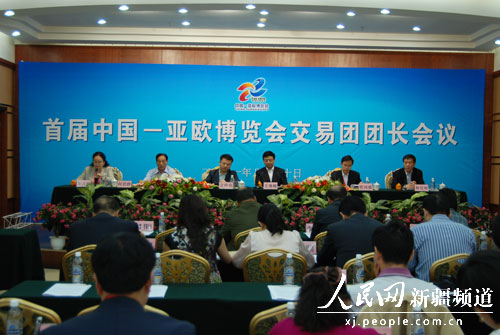Security tightened for China-Eurasia Expo
 0 Comment(s)
0 Comment(s) Print
Print E-mail
Xinhua, August 31, 2011
E-mail
Xinhua, August 31, 2011
Authorities have boosted security in Urumqi as the northwestern Chinese city prepares to host the first China-Eurasia Expo, which leaders of China and its neighboring countries in central and south Asia are expected to attend.
 |
|
Security tightened in Urumqi as the northwestern Chinese city prepares to host the first China-Eurasia Expo. |
Fully-armed, rifle-toting police were seen guarding the convention venue located in suburban Urumqi, capital of Xinjiang Uygur Autonomous Region, on Tuesday, two days before the expo's official opening.
SWAT (special weapons and tactics) teams were deployed to handle security checks at the entrance.
Authorities declared a low-altitude "no-flight zone" in areas around Urumqi, effectively banning anything from light aircraft to hot-air balloons during the expo. Pigeon flying has also been banned.
Airports in a dozen cities, including Beijing and Shanghai, have been tightening security screenings for Urumqi-bound flights since Sunday. Passengers are asked to remove their shoes and have their carry-on luggage opened.
The increased security comes amid a two-month crackdown on terrorism ordered by regional authorities earlier this month following an outbreak of violence in Xinjiang's major southern cities, Kashgar and Hotan, that left at least 40 dead and dozens injured. A unit of the Snow Leopard Commandos, an elite counter-terrorism force under the People's Armed Police, has been deployed to the region from Beijing.
"Security is paramount," said Yu Xiudong, a senior member of the expo's organizing committee, on Tuesday. "We should make meticulous preparations against all security emergencies to ensure a safe expo."
Li Jingyuan, secretary of the expo's executive committee, said at a press briefing that Chinese Vice Premier Li Keqiang is expected to attend the expo with foreign leaders, including Pakistani President Asif Ali Zardari and Kyrgyz President Roza Otunbayeva.
The expo was upgraded from the China Urumqi Foreign Economic Relations and Trade Fair, a regional trade fair, last year. Organizers said the upgrade would make Urumqi an important exchange platform for leaders and businesses in China and its western and southern neighbors, such as Russia, Kazakhstan, and Pakistan.
Xinjiang's top official, Zhang Chunxian, met with Pakistan's Zardari upon his arrival on Tuesday. The leader of Pakistan said China is like a second home to him, and the people of the two countries have their hearts and minds together.
Details of the 20-minute talk were not immediately disclosed but observers said Sino-Pakistan cooperation on trade, investment and anti-terrorism efforts will top the agenda.
Xinjiang, located in a volatile region which is no stranger to unrest, has been battling separatism, extremism and terrorism for decades. About 41.5 percent of Xinjiang's 21 million population are Uygurs, a largely Muslim ethnic group, and security experts worry the growing religious extremism in the region has fanned most of the violent attacks.
During Xinjiang's most deadly unrest in decades, 197 people were killed and about 1,700 others injured after riots broke out in Urumqi on July 5, 2009.
After the riots, the central government implemented a series of policies to boost economic development in Xinjiang, hoping that a rise in living standards and prosperity could curb the root of the violence.
Bag checks and car trunk inspections in public places have also become part of people's daily routine in the city.






Go to Forum >>0 Comment(s)